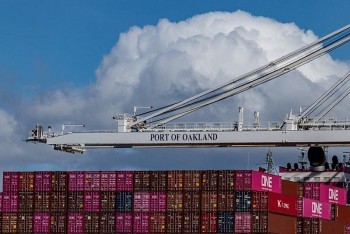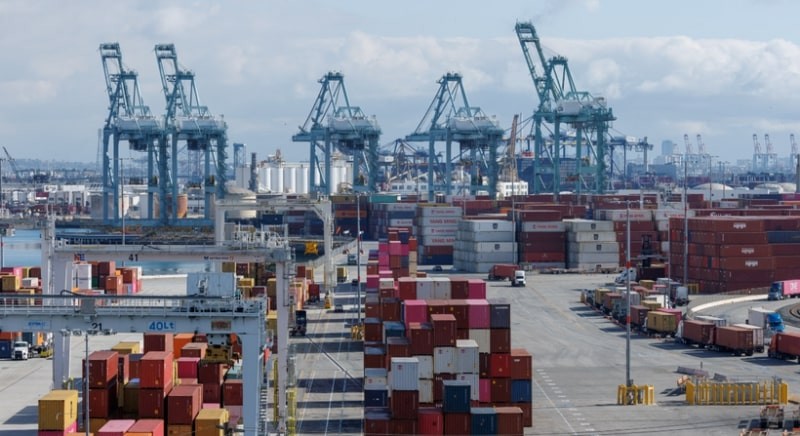Negotiation Over Confrontation: Countries Taking Cautious Approach to US Tariffs
| Vietnam, US Strengthen Trade Ties with US $90.3 Billion in New Agreements | |
| Understanding Trump's Tariffs in Five Charts |
Just hours after the 25% tariff on steel and aluminum imports to the US took effect on March 12, the EU announced retaliatory tariffs on €26 billion ($28.33 billion) worth of US goods, set to take effect in April. Senior European officials strongly criticized President Trump's policy, warning of the instability it could cause.
 |
| Prime Minister Keir Starmer meets US President Donald Trump in the Oval Office at the White House on February 27, 2025, in Washington, DC. (Photo: Reuters) |
Meanwhile, London’s reaction has been much more measured. According to The New York Times, British Prime Minister Keir Starmer expressed “disappointment” over the global tariffs on steel and aluminum during a parliamentary session but emphasized that the UK would adopt a “pragmatic approach.” The Prime Minister stressed that a new trade agreement would “keep all options open” and expressed confidence in convincing the US leadership that London and Washington share a balanced trade relationship.
A spokesperson for Downing Street reiterated in The Guardian: “The UK and the US have a strong economic relationship. This relationship is based on fair, balanced, and reciprocal trade, and we are working with the US administration to protect our interests.”
During his visit to the White House in February 2025, Starmer received positive signals from the US side when President Trump suggested that a "real trade agreement" could render the tariffs unnecessary.
This strategy provides the UK with an opportunity to avoid direct losses from US tariffs. According to The Telegraph, British steel exports to the US accounted for about 9% of the country's total steel exports in 2024, with the US being its second-largest market after the EU. Without exemptions, the UK steel industry could face severe damage, which Gareth Stace, Director-General of UK Steel, described as a devastating blow. The UK steel sector currently employs 33,000 people directly, along with 42,000 workers through its supply chain.
However, this approach carries political risks. Analysts suggest that if the US grants the UK tariff exemptions while continuing to impose tariffs on the EU, it could complicate Starmer’s efforts to improve relations with Europe post-Brexit.
Despite being one of the initial targets of US tariffs, Mexico has maintained a restrained stance. President Claudia Sheinbaum has refrained from issuing strong reactions to the new tariffs and has remained silent on the possibility of retaliation. The Mexican government has decided to delay any actions until at least April to allow more time for negotiations with the US.
Politico quoted former Mexican Ambassador to the US, Arturo Sarukhán, who noted that Mexico’s administration understands that an immediate, aggressive response, like that of the EU and Canada, could backfire.
Additionally, Mexico is factoring in political considerations: Washington has been increasing pressure on Mexico regarding fentanyl control, and the Sheinbaum administration is wary of exacerbating tensions with the US.
According to Politico, China’s response to certain rounds of Trump’s tariffs has also been notably restrained. While the Chinese government has retaliated against Trump’s fixed 10% tariff on their exports to the US, these actions have not been immediate. On two recent occasions, China gave Trump approximately a week to negotiate before taking specific actions. Notably, China has not retaliated against the latest US tariffs on steel and aluminum.
Experts in US-China relations believe Beijing is aiming for an agreement that could ease trade restrictions, similar to the 2020 deal signed during Trump’s first term.
Other countries, such as Australia, Japan, and Brazil, have also chosen not to retaliate immediately. Instead, they are seeking opportunities to negotiate tariff exemptions.
The "wait-and-see" strategy could help these nations avoid a full-blown trade war. However, it also means confronting a US administration that is willing to use tariffs as leverage in negotiations.
 | Timeline of Trump 2.0 Trade Policy At the beginning of his second term, President Donald Trump implemented a series of new trade policies to adjust the economic balance and serve the ... |
 | US Businesses Struggle Amid Trump's Unpredictable Tariff Policies Amid continuous shifts in the tariff policies of President Donald Trump's administration, some US businesses have reduced their orders or put investment plans on hold. |
 World
World
Easing of US-China Tariffs: Markets React Positively, Experts Remain Cautious
Recommended
 World
World
Pakistan NCRC report explores emerging child rights issues
 World
World
"India has right to defend herself against terror," says German Foreign Minister, endorses Op Sindoor
 World
World
‘We stand with India’: Japan, UAE back New Delhi over its global outreach against terror
 World
World
'Action Was Entirely Justifiable': Former US NSA John Bolton Backs India's Right After Pahalgam Attack
 World
World
US, China Conclude Trade Talks with Positive Outcome
 World
World
Nifty, Sensex jumped more than 2% in opening as India-Pakistan tensions ease
 World
World
Easing of US-China Tariffs: Markets React Positively, Experts Remain Cautious
 World
World


